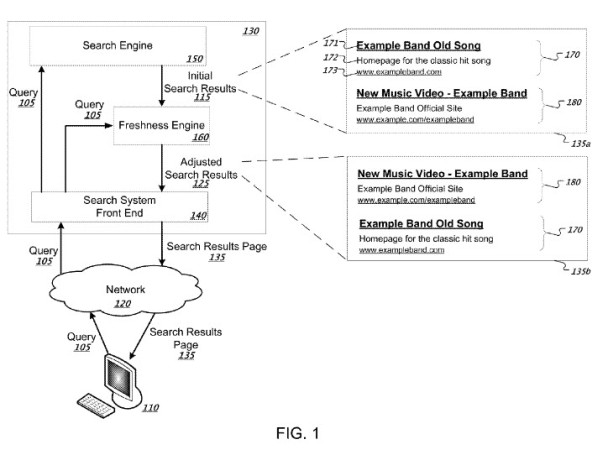Rankings for pages in search results might be boosted or demoted based upon a decision by Google as to how “fresh seeking” the query is and how “fresh” the resource that might be pointed to is.

A Flower along the Sea Wall in Carlsbad surprised me.
Google Freshness-Based Ranking
A patent granted this week for Google discusses the concept of “Freshness Based Ranking” and is named that. It not only looks at whether the query in question might prefer a fresher result, but also older results, and could boost both types of results based upon what seems most called for.
The search engine might try to determine that a query is of particular recent interest by looking to see if there has been several occurrences of the query:
- Being received within a recent time period;
- On blog web pages within a recent time period;
- On news web pages within a recent time period;
- On social network web pages within a recent time period;
- Requesting news search results within a recent time period;
- Requesting news search results within a recent time period versus requesting web search results within the time period;
- User selections of news search results provided in response to the query; or
- More user selections of news search results versus user selections of web search results within the time period
A freshness value might be calculated based upon percentile numbers of how often that query term shows upon in those places (search results, blog pages, news pages, social media pages).
Related Content:

The patent shows how a Fresh Video from a band might be boosted in search results.
There are times when it seems that older resources are preferred, and in those cases, the same types of sources (blogs, news, social media, search queries) might be reviewed to see the frequency in which particular query terms appear within those.
The Google freshness patent is:
Freshness based ranking
Invented by: Zhihui Chen, and Jonathan Frankle
Assigned to: Google
US Patent 9,189,526
Granted: November 17, 2015
Filed: March 15, 2013
Abstract
Methods, systems, and apparatus, including computer programs encoded on computer storage media, for ranking search results. One of the methods includes receiving a search result obtained in response to a query, wherein the search result identifies a resource and has an associated score S. A determination is made that users prefer newer resources over older resources for the query and that the resource is a new resource. A new score S’ is associated with the resource in place of S, based on the determination that users prefer newer resources over older resources for the query and that the resource is a new resource.
Freshness might be seen as a kind of burstiness in requests for information about a topic, as described in this part of the patent description:
Another example a fresh-seeking query signal is a high number of occurrences of terms of the query on web pages that are frequency updated, e.g. blog web pages and social network web pages, and that are created within a recent period. Because blog web pages and social network web pages are frequently updated, a high number of occurrences of terms of the query on blog web pages or social network web pages created within the recent period can indicate a query of recent interest. The freshness engine can access indexing statistics database for statistics on terms and phrases indexed by blog search engine during the recent period.
I’m reminded of a post I wrote about a Microsoft patent a few years back that seems to look for similar bursts in search activity for topics, which I titled How Burstiness Of Search Queries Could Increase Page Rankings
In addition to mentions on blogs and social media, Google might also look for several mentions of the same topic on news pages, which can indicate “a query of recent interest.”
To use an example, if people started searching Googe news search for “New Google Freshness patent” as opposed to in Google Web Search, at a high ratio, that might indicate that people are looking for fresher results on that topic.
The patent tells us that the search engine might determine whether or not a query might seem to be seeking fresh results by the rate in which the term starts appearing upon the Web, and if it does, the search engine might then boost new content about that topic in search results that are looking for it.
Search News Straight To Your Inbox
*Required
Join thousands of marketers to get the best search news in under 5 minutes. Get resources, tips and more with The Splash newsletter: